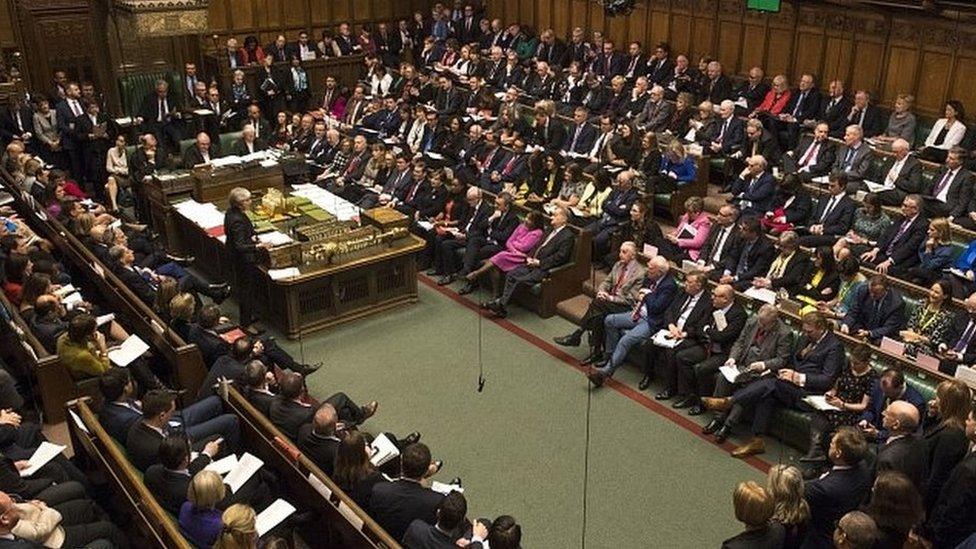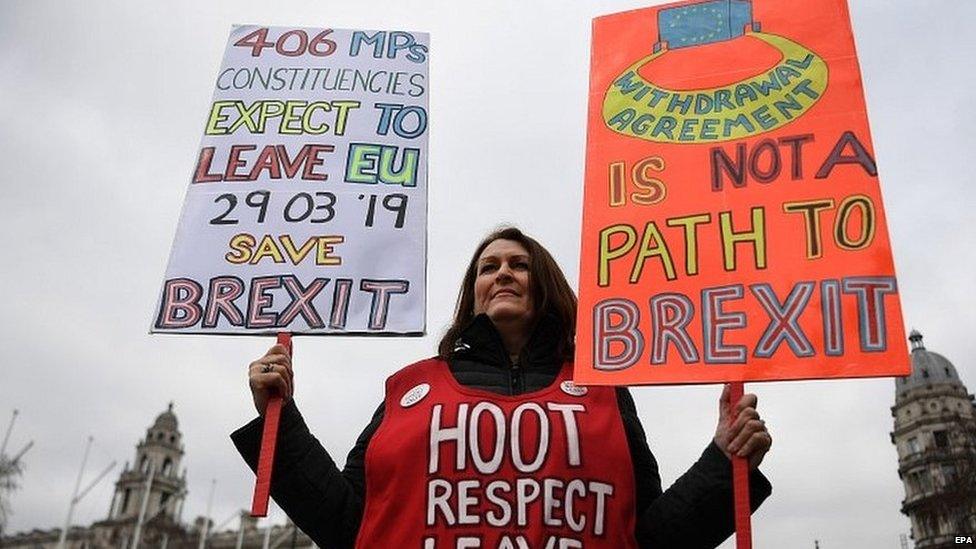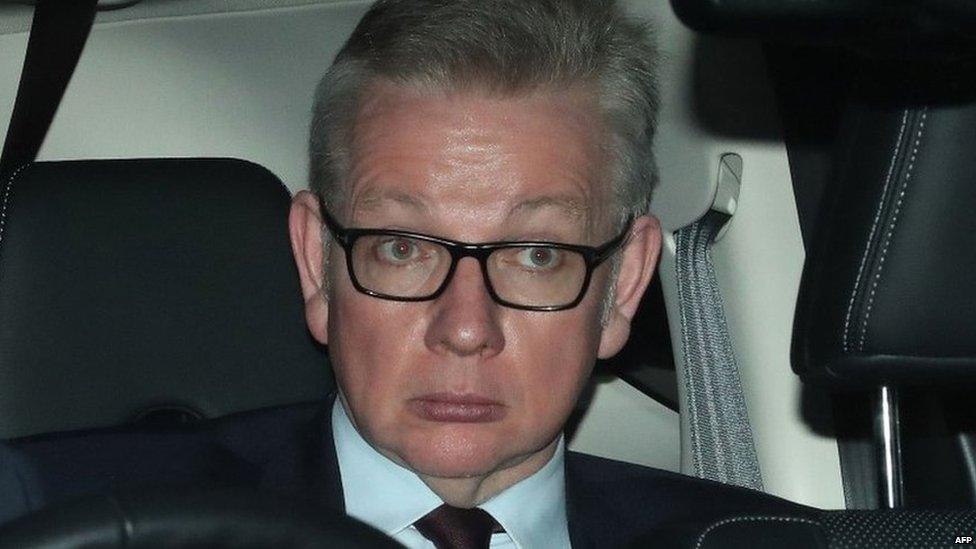Week ahead in Parliament
- Published

The week ahead could see important votes on Monday, Tuesday, Wednesday and Thursday
Nobody really knows what is going to happen in Parliament next week.
But it is shaping up to be the most important few days in the Commons since May 1940, when the Norway debate effectively ended Neville Chamberlain's premiership and brought Winston Churchill to power.
As MPs seek to grapple with Brexit, there could be important votes on Monday, Tuesday, Wednesday and Thursday.
Plot will collide with counter-plot and rebellion with clampdown, despite the planned postponement of the scheduled Brexit Day on Friday.
But all the cunning plans and knavish tricks will take place within the framework of parliamentary rules - and while these are more flexible than many people realise, they will shape events, and they do point to the pressure points the warring factions will have to deal with.
What follows is guesswork about how the week may play out.
On Monday, the Commons will have a chance to consider alternative courses of action on Brexit. Already, there is a new variation of the Letwin-Boles-Benn gambit, proposing to seize control of the Commons agenda from the government on 27 Wednesday.
This would allow a cross-party alliance of MPs a chance to weigh in behind a new form of Brexit, or even to force through a Bill to compel the PM to follow a new policy.
Tuesday now seems the likely date for the next attempt to hold a "meaningful vote" to obtain MPs' approval of Theresa May's Brexit deal, in the hope of turning round the two huge defeats it suffered when she tried in January and early March.
This might entail a vote to over-ride the Speaker's objections, if the deal is not deemed "substantially different" to the one already rejected twice by MPs - so the PM would need a decent prospect of mustering a Commons majority to proceed, and might abandon the vote at short notice.
If the PM succeeds, then MPs would swiftly be asked to pass a Withdrawal Agreement Bill, putting the deal into law. If she fails, the alternatives will be either a long extension to the UK's EU membership, or what is known as a no-deal exit.
Conservative MPs who back staying in the EU or a "soft Brexit" are worried the PM might pivot to the no-deal option.
That could well trigger the frequently threatened, but so far never manifested, rebellion of Remainer ministers. A delegation went in to see the Chief Whip Julian Smith, on Thursday.
If the Letwin-Boles-Benn amendment passes on Monday, Wednesday would see the actual debate on whatever motions on the UK's future relationship with the EU were then selected by the Speaker.
This could allow a rough and ready version of the "indicative votes" process MPs have been discussing for some time now, where perhaps seven options, including the prime minister's deal, Article 50 revocation, a second referendum, the PM's deal plus a customs union, the PM's deal plus both a customs union and single market membership, a free trade agreement, and a no-Deal Brexit, would be voted on.
It is possible other options which could command reasonable levels of support might be added to the mix.
Marcus Fysh, from the Brexiteer ERG group, has attacked this proposition as "the most ludicrous, childish and unrealistic idea I have ever seen." At the end all would be voted on simultaneously - MPs would fill out a ballot paper on each, voting for or against, and the relative support could then be seen.

Ministers will seek to pass secondary legislation to change the date of Brexit
Crucially, all the ballot-filling would be done at the same time; it would not be a case of MPs voting on one option, hearing the result, and then voting on the next.
So there would be no tactical voting between options.
Interestingly, Brexit Minister Kwasi Kwarteng has told MPs that he would be surprised if this was anything other than a free vote and, this kind of indicative voting is probably less threatening to the government than a more stringent plan to dictate a policy by setting it in law.
But the latter is still a possibility - a business of the House motion allowing a Bill to be tanked through the Commons and then the Lords to compel the prime minister (or at least the Government) to change course and adopt some new policy on Brexit.
Such legislation would, doubtless, face strong resistance and a determined filibuster. Interestingly, a certain amount of groundwork has been laid.
Almost unnoticed, earlier this year, the Lords passed a Labour motion requiring time to be found to pass any Brexit motion emerging from the Commons (note the wording here - it doesn't have to be a government-approved measure) suggesting the long term planning for this contingency on the Remain side was pretty thorough.
Thursday seems the probable moment for the government to push through the postponement for Brexit Day from next Friday.
Much depends on whether the PM gets her deal through. If not, a longer postponement would certainly be highly controversial, not least because it would require the UK to hold European parliament elections, which could see the voters deliver a massive rebuke to the main parties.
The process requires a minister to move a statutory instrument (SI) to change exit day in UK legislation, but only to match the date when the EU Treaties cease to apply under Article 50. Both the Commons and the Lords will have to pass the SI, so there will be a one-off vote in both houses.
There is, incidentally, absolutely no mechanism allowing backbenchers to introduce and pass SIs - they have to come from the Government.
All of this is highly conditional and pretty speculative - but it represents my best guess as to how the coming week will unfold. Here's my run-though of the parliamentary business.
Monday 25 March
The Commons opens at 14.30 GMT with Defence Questions followed by any ministerial statements or urgent questions. Expect this to include the prime minister updating MPs on the outcome of her latest bout of euro-negotiation.
The main business will be an amendable motion on Brexit (technically, a motion under Section 13(4) of the European Union (Withdrawal) Act 2018). This offers MPs a couple of ways of influencing events.
Firstly under default Commons rules, the debate would normally last just 90 minutes, and so there will certainly need to be a Business of the House motion to remove the time limit. That could be amended in all kinds of ways, to require further opportunities for debate and votes later in the week.
Then there's the main motion itself, to which all kinds of alternative Brexit (or non-Brexit) schemes could, potentially, be attached.
A revocation Bill, cancelling the UK's notice to leave the EU is a theoretical possibility if MPs were to vote to take control of the Commons agenda for that purpose but it is wildly improbable that it could pass both Houses by exit day on Friday, in the teeth of what would certainly be a determined filibuster. Perhaps more likely is an attempt to require a postponement of Brexit beyond the prime minister's proposed new cut-off date of 30 June.
On the Committee corridor, the Public Accounts Committee is looking at the apprenticeships programme, with witnesses from the Department for Education, the Education and Skills Funding Agency, the Apprenticeship Programme, and the Institute for Apprenticeships and Technical Education.
In 2017-18, levy-paying employers used 9% of the funds available to them to pay for new apprenticeships. These employers accessed £191 million of almost £2.2 billion of levy funds and government top-up available to them. The funds expire after 24 months.
The department had projected that levy-paying employers would use 13% of the available funds in 2017-18. Partly because the amount used was lower than expected, the department spent less on the programme than it had budgeted. In 2017 18, it spent £1.6 billion - a £400 million underspend. And, at the time of our work, it expected to spend around £1.7 billion in 2018-19 - a £500 million underspend.
The average cost of training an apprentice on a standard is around double what was expected, making it more likely that the programme will overspend in future.
In Westminster Hall there's a debate at 16.30 GMT on e-petition 233926, which states "people are scared of the amount of knife crime with apparently very little deterrent to stop people carrying knifes."
The petition attracted 104,416 signatures - and a government response that "conviction of a knife or offensive weapon offence - threatening or possession - is now more likely to result in some form of custodial sentence, and for longer than at any point in the last ten year".
In the Lords, from 14.30 GMT, the main event is a debate on exiting the EU. Watch out for the now-traditional Labour amendment opposing a no-deal exit from the EU.
And Arch-Remainer Lord Adonis is also promising to propose an amendment calling for the government to cancel Brexit, by revoking Article 50 - the formal notification to the EU of intent to leave.
Tuesday 26 March
The Commons day begins with Health and Social Care Questions.
And the day's Ten Minute Rule Bill on Compensation Orders (Child Sexual Abuse), from the Conservative Andrew Griffiths, is an attempt to require the Justice Secretary to report in the issue.
Then MPs turn to consideration of Lords amendments, first to the Healthcare (International Arrangements) Bill, now re-named the Healthcare (European Economic Area and Switzerland) Bill.
This suffered a series of significant defeats in the Lords, limiting its scope to replacing pre-Brexit healthcare arrangements with EU and EEA states, rather than giving powers to make new deals across the globe.
Then they will deal with Lords amendments to the Offensive Weapons Bill which created a "trusted couriers scheme" to allow some deliveries of bladed items through the post.
Also scheduled is a debate under Section 5 of the European Communities (Amendment) Act 1993... which is a legally-required report on the state of the EU economy.
But it is entirely possible that some or all of the above could be postponed to make way for a third "Meaningful Vote" debate.
In Westminster Hall, the DUP's Jim Shannon leads a debate on forced live organ extraction. He says China is systematically taking organs for transplant from political and criminal prisoners including Christians, Falun Gong and Uyghur Muslims. As well as highlighting the issue he would like to see the law changed to stop people from the UK receiving live organ transplants from people who have no choice in the matter.
Other debates include:
Creating a Royal Commission on police funding in the 21st century
Administration of personal independence payments on Merseyside
The role of the Police Ombudsman for Northern Ireland in legacy cases
My Committee picks are the Home Affairs Evidence Session on Serious violence, with witnesses including the Director General (Operations) of the National Crime Agency Steve Rodhouse, the Commissioner of the Metropolitan Police, Cressida Dick, and the Chief Constable of the West Midlands, Dave Thompson.
Also worth watching is the Health and Social Care session on medicinal cannabis, at 14.30 GMT, which follows up complaints that moves to give patients access to the drug are not succeeding.
Health Minister Baroness Blackwood and Police Minister Nick Hurd give evidence, alongside a battery of medical experts.
In the Lords (2.30 pm) peers will rattle through no fewer than 17 Brexit-related statutory instruments.
They start with the Draft REACH etc. (Amendment etc.) (EU Exit) Regulations 2019, a measure that rewrites EU law on the registration, evaluation, authorisation and restriction of chemicals, so it will operate effectively post Brexit.
Unusually the measure faces a fatal motion from Lord Fox and a regret motion from Labour's Lord Whitty
That is followed by three measures on the Common Fisheries Policy, six on agricultural issues, three on customs issues, and a mixed bag of further measures covering such matters as Cash Controls, the Extraterritorial Application of Third Country Legislation, the import and export of Cat and Dog Fur, and trade in Dual-Use Items and Firearms.
Wednesday 27 March

Michael Gove will be questioned on his department preparations for Brexit
The Commons opens, at 11.30 GMT, with Scotland questions, followed by what promises to be a particularly charged edition of Prime Minister's Question Time, at noon.
The day's Ten Minute Rule Bill from the Labour MP Ruth George is on Sky Lanterns (Prohibition).
She believes the balloon lanterns, also known as Chinese lanterns, are "dangerous and irresponsible", pose a serious fire safety hazard due to their uncontrolled and unpredictable flight paths, and are dangerous to livestock, crops and the environment. She points out that fire and rescue services across the country oppose the mass release of sky lanterns due to the fire risk of starting wildfires on moorland.
The current agenda then sees MPs dealing with a series of Brexit related Statutory Instruments, on:
Food Additives, Flavourings, Enzymes and Extraction Solvents
Extraterritorial Application of Third Country Legislation
Animal Health, Plant Health, Seeds and Seed Potatoes.
Again, this business may be postponed if the Letwin amendment is agreed on Monday.
My committee picks are the Environment, Food and Rural Affairs session, at 9.30 GMT, entitled "Is Defra ready for Brexit?"with Secretary of State Michael Gove and his team of ministers, Dr Thérèse Coffey, David Rutley , Robert Goodwill and Lord Gardiner.
Defra is one of the government departments most affected by Brexit and is facing huge challenges.
On the Committee corridor, Northern Ireland Affairs has a hearing with the Northern Ireland Secretary, Karen Bradley, which can be expected to focus on the increasing concern at the persistent political stalemate there.
In the Lords, there is currently no business scheduled beyond the usual half hour of questions to ministers; the expectation is that peers may have to deal with Commons amendments to the Offensive Weapons Bill and the Healthcare (International Arrangements) Bill.
Thursday 28 March
The Commons opens, at 9.30 GMT, with forty minutes of Environment, Food and Rural Affairs Questions - followed by mini-question times for the MPs who speak on behalf of the Church Commissioners, the House of Commons Commission, the Public Accounts Commission and the Speaker's Committee on the Electoral Commission.
Then comes the weekly Business Statement from the Leader of the House, Andrea Leadsom.
The schedule then shows two Backbench Business Committee debates, on Beer Taxation and Pubs, and on planning controls on Shale Gas Exploration, aka fracking.
Again, this is business that may be shifted, this time in favour of consideration of a Statutory Instrument to postpone Brexit Day, which otherwise would be due the following day.
In Westminster Hall, there will be a debate on the Justice Select Committee's report on the Disclosure of youth criminal records, led by Committee Chair, Bob Neill
In the Lords, after the usual half hour of questions to ministers, there is another bumper helping of statutory instruments for peers to digest: three on employment rights issues, including those of Agency Workers, and one on Forestry and Land Management in Scotland.
And that is followed by a debate on the continuing and evolving role of the Commonwealth.
Friday 29 March
Neither House is due to sit on Friday - at least not yet.
- Published30 July 2019

